|







Please post and circulate this flyer

flyer requires free Adobe reader available from

|
Keynote Speaker
Karen Leonard
Professor
Anthropology-Social Science
University of California, Irvine
"American Muslims: Constructions of Race, Religion, and the Nation."
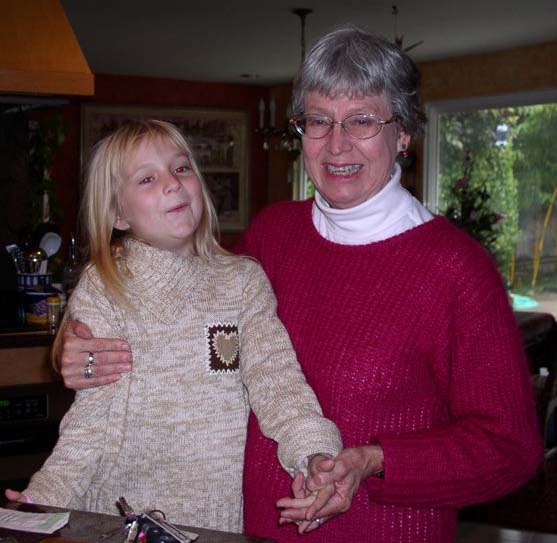
Karen Leonard, pictured here with her granddaughter Evan, is an historian and anthropologist specializing in South Asia, Asian Americans, and Muslim Americans. She has worked in India, Pakistan, Kuwait, the UAE, and Uzbekistan, as well as the US. She has published books on the social history of an Indian caste in Hyderabad, India, on the Punjabi Mexicans of southern California, on South Asian Americans, and on Muslims in the US. The last examines the state of research; it is an extended bibliographic essay and relates Muslim Americans to the changing religious, social, and political landscape in America.
Professor Leonard has recently published: "Muslims in the United States: the State of Research", Russell Sage Foundation, NY, 2003.
Panel Descriptions
Muslims and Public Policy
Muslims, globally, can be described to be beleaguered after the tragedies of 11 September, 2001 and the continuing conflicts in Afghanistan and Iraq. Over the past two years, Muslims in the US have seen all their political gains wither away and have suffered unprecedented curtailment of civil rights. In this elections year, the Muslims and Public Policy panel will explore the impact of foreign and domestic policies on Muslims, as well as the impact and role of this, the second largest faith community in the Unites States, on public policy.
Teaching Islam
The Teaching Islam panel will look at how Muslims and their religion are represented and taught in the media, in the schools and the academy. Who decides the curricula and messages? What are the competing agendii? How can positive change be achieved?
Construction of the 'Other' amongst the Abrahamic Faiths
Countless efforts of inter-faith dialogue ignore or simply work around the notions of the other. While there are many successes, the disturbing processes of demonising other faiths colour all aspects of interactions among people of different faiths. This panel will analyse and cut to the heart of Construction of the 'Other' among the three Abrahamic faiths. The impact of these notions of the other in the public sphere will be explored.
Town Hall Meeting
This final session of the Islam in America Conference will bring together all the Conference panellists. The participants will have an opportunity to discuss, in a comprehensive manner, issues cutting across the three different panels. The Town Hall Meeting will bring the framework of the entire Conference into focus.
Chair
Jocelyne Cesari
Principal Research Fellow - Centre National de la Recherche Scientifique
Professor, Center for Middle Eastern Studies, Harvard University
Principal Research Fellow at the National Center for Scientific Research (CNRS), Jocelyn Cesari’s training, professional experience, and academic expertise are in Political Science, the Middle East and Islamic studies. In the late 80s, when most of the scholarship in France neglected the religious dimension of Muslim immigration, her PhD dissertation ("L'Islam et le Politique en France: Les modalités d'émergence d'une condition minoritaire" (Islam and Politics in France: The Emergence of a Minority), 1991) was a pioneer work on the condition of Muslims as a religious minority. Since her recruitment at CNRS in 1992, she has done extensive empirical research, providing analysis to the following questions: How do Muslims adapt their religious practices to the French secular context? How do they organize and mobilize their religious communities? She has demonstrated the sociological emergence of a French Islam and the influence of secular State and society on the ways that Muslims refine their relationship to their religious tradition. She has written numerous books and articles on these topics, including Plus Marseillais que moi tu meurs: Migrations, identités et territoires à Marseille (Migrations, Identities and Territory in Marseille, 2001); Musulmans et Républicains: les jeunes, l’islam et la France (Muslims and the Republic: Youth, Islam and France, 1998); and Géopolitique des islams (Geopolitics of Islam, co-authored with Bernard Botiveau, 1997).
In the late 90s, she extended the question to the European space and started investigating the building of Muslim minorities in Western Europe. In 1998, she created the Network On Comparative Research Islam Muslims in Europe (NOCRIME), comprising nine scholars from France, Germany, Italy, Spain, Sweden, the UK and the Netherlands. The network's purpose is to move beyond collections of case studies of Muslim minorities in European countries in order to design research projects whose hypotheses, data, and findings will serve policy-makers in the domains of immigration, race, ethnicity and multiculturalism, both at national and European levels. On behalf of the European commission, NOCRIME is undertaking a research project on Islam, citizenship and European integration, which is scheduled for completion in 2004.
In 1998 Cesari came to the Harvard University Center for Middle Eastern Studies as a Fulbright scholar, and has since taught at Columbia University, where she conducted research on the transnational Muslim elite in the US under the auspices of the Ford Foundation. At CMES she conducts a seminar on Islam in Europe and the US in the aftermath of September 11th, and will be teaching a course entitled "Muslims in Multicultural America" in the Fall of 2002 through the Anthropology Department and the Divinity School.
Panelists
Charles Dunbar
Warburg Professor of International Relations
Simmons College
 Charles Dunbar became the Warburg Professor in International Relations at Simmons College in
2001. He came to Boston from Cleveland where he served as President of the
Cleveland Council on World Affairs and taught at Case Western Reserve
University. In 1998, as United Nations Secretary-General Kofi Annan's Special
Representative, he ran a 500-person, $60 million-a-year effort to hold a
referendum to determine whether Western Sahara, a former Spanish colony, would
become independent or be made part of Morocco. He is writing a book on this
experience with support from the United States Institute of Peace. From
1962-1993 he was a State Department Foreign Service Officer, serving as
Ambassador to Yemen and Qatar and Chargé d'Affaires in Afghanistan. Professor Dunbar also worked in Iran, Afghanistan, Morocco, Algeria, and Mauritania. He holds an AB from Harvard and an MA in International Relations from Columbia. Most recently he has studied at Princeton's Woodrow Wilson School of Public and International Affairs as a State Department Mid-Career Fellow.
Charles Dunbar became the Warburg Professor in International Relations at Simmons College in
2001. He came to Boston from Cleveland where he served as President of the
Cleveland Council on World Affairs and taught at Case Western Reserve
University. In 1998, as United Nations Secretary-General Kofi Annan's Special
Representative, he ran a 500-person, $60 million-a-year effort to hold a
referendum to determine whether Western Sahara, a former Spanish colony, would
become independent or be made part of Morocco. He is writing a book on this
experience with support from the United States Institute of Peace. From
1962-1993 he was a State Department Foreign Service Officer, serving as
Ambassador to Yemen and Qatar and Chargé d'Affaires in Afghanistan. Professor Dunbar also worked in Iran, Afghanistan, Morocco, Algeria, and Mauritania. He holds an AB from Harvard and an MA in International Relations from Columbia. Most recently he has studied at Princeton's Woodrow Wilson School of Public and International Affairs as a State Department Mid-Career Fellow.
Amaney Jamal
Assistant Professor of Political Science
Princeton University
Amaney Jamal is Assistant Professor of Political Science at Princeton University who studies the politics of the Middle East. She has done extensive research in the Middle East and on the Arab American community in the Detroit Metro area. Her dissertation, Democratic Citizens in non-Democratic Nations, examines the political and civic attitudes of Palestinian associational members, comparing them to the attitudes of the larger Palestinian population. For this project, she administered two sets of surveys. The first survey was a random sample of the general Palestinian population. The survey second instrument investigated the opinions and attitudes of associational members. She finds that the impact associations have on the quality of civic engagement will vary according to the relationship that those associations have with the ruling government. Jamal's research interests in civic engagement also extend to the study of political socialization and participation of Arab and Muslim immigrants in the United States. In this study, with Professor Ann Lin, they look at Arab American citizenship and patterns of political behavior. Based on in-depth personal interviews with Arab immigrants living in the Detroit Metro area, they consider the various processes by which Arab immigrants become Arab-American, learning to navigate a political world composed of unfamiliar government actions, policy requirements, and political opportunities. Together, they have presented several papers at professional conferences and are currently writing a manuscript based on their findings.
Jamal brings to the DAAS project over five years of research experience by examining the political attitudes and patterns of participation of Arab Americans in the Detroit Metro area. Through her research, she has established a multitude of contacts and ties to individuals, organizations, and community leaders in the Arab American community. She also brings to the project not only familiarity and experience with survey research, but having conducted her own surveys in the Middle East, she is aware of Arab cultural sensitivities and knows how to manage these in the design of survey instruments. As a student of Middle East politics, she further brings to the project extensive knowledge about the countries of Arab American ancestry and the religion of Islam. Currently, she is also working on Columbia's Muslims in America Project.
Muqtedar Khan
Visiting Fellow - Brookings Institution
Assistant Professor of Political Science
Director of International Studies
Adrian College, Michigan
 Muqtedar Khan is presently a Visiting Fellow at the Brookings Institution. He is a part of the Brookings project on US Foreign Policy towards the Islamic World at the Saban Center for Middle East Policy.
Dr. Muqtedar Khan is Assistant Professor of Political Science and Director of International Studies at Adrian College in Michigan.
He is on the board of the Center for the Study of Islam and Democracy and is the Vice President of the Association of Muslim Social Scientists.
He earned his Ph.D. in International Relations, Political Philosophy, and Islamic Political Thought, from Georgetown University in May 2000.
Dr. Khan's column has appeared in The Washington Post,
The Wall Street Journal, Newsweek (Arabic), New York Post, Newsday, Arizona Tribune, Duluth News Tribune, The Daily Telegraph (London), The Sun (UK), Jakarta Post, Jordan Times, Manila Times, Outlook India, Palestine Times, Calgary Herald, The Daily Telegram (MI), San Francisco Chronicle, Detroit Free Press, Detroit News, Washington Report on Middle East Affairs, Muslim Democrat, Iviews.com, The Christian Century, Islamic Horizons, The Message, ptimes.com, Theglobalist.com, Progressive.org, Theglobalist.com, fpif.org, Freerepublic.com, MiddleEast Online, Beliefnet.com, Arabies Trends, Al-Mustaqbal, Saudi Gazette, and many other periodicals world wide.
Muqtedar Khan is presently a Visiting Fellow at the Brookings Institution. He is a part of the Brookings project on US Foreign Policy towards the Islamic World at the Saban Center for Middle East Policy.
Dr. Muqtedar Khan is Assistant Professor of Political Science and Director of International Studies at Adrian College in Michigan.
He is on the board of the Center for the Study of Islam and Democracy and is the Vice President of the Association of Muslim Social Scientists.
He earned his Ph.D. in International Relations, Political Philosophy, and Islamic Political Thought, from Georgetown University in May 2000.
Dr. Khan's column has appeared in The Washington Post,
The Wall Street Journal, Newsweek (Arabic), New York Post, Newsday, Arizona Tribune, Duluth News Tribune, The Daily Telegraph (London), The Sun (UK), Jakarta Post, Jordan Times, Manila Times, Outlook India, Palestine Times, Calgary Herald, The Daily Telegram (MI), San Francisco Chronicle, Detroit Free Press, Detroit News, Washington Report on Middle East Affairs, Muslim Democrat, Iviews.com, The Christian Century, Islamic Horizons, The Message, ptimes.com, Theglobalist.com, Progressive.org, Theglobalist.com, fpif.org, Freerepublic.com, MiddleEast Online, Beliefnet.com, Arabies Trends, Al-Mustaqbal, Saudi Gazette, and many other periodicals world wide.
Teaching Islam Panellists
Chair
Diane Moore
Director of the Program in Religion and Secondary Education
Lecturer on Religion and Education
Harvard Divinity School

Diane Moore pursues research interests in religion, values, and public education and the construction of policy and curricula that is inclusive of the world’s religious traditions within First Amendment guidelines. She is currently writing Overcoming Religious Illiteracy: A Multicultural Approach to the Study of Religion in Secondary Education, scheduled for publication in the fall of 2004. In addition to her appointment at Harvard, Professor Moore is on the faculty of Phillips Andover Academy, where she teaches in the Department of Philosophy and Religious Studies. She is also an ordained minister in the Christian Church (Disciples of Christ).
courses recently taught:
Colloquium in Religion and Secondary Education
Supervised Teaching Practicum
Religion, Values, and Public Education
Panelists
Louis Abdellatif Cristillo
Project Coordinator - Muslims in NYC Project
Columbia University
Louis Abdellatif Cristillo recently completed his Ph.D. in anthropology and education at Teachers College, Columbia University. Since 1998, Dr. Cristillo has served as project coordinator for Columbia University's Muslims in NYC Project, a groundbreaking multidisciplinary study sponsored by the Ford Foundation examining the complex problems of identity and community facing Muslims in New York City. From 1978 to 1996, Mr. Cristillo worked in the Kingdom of Morocco, first as an educator for the Moroccan Ministry of National Education and later as the director of an intercultural studies program at an American overseas school in Rabat, Morocco. Dr. Cristillo's interests include exploring the interplay of religiosity and ethnicity in formal and non-formal Islamic education in the United States, identity formation and the racialization of Muslim youth in the public schools, and the sociology of religious and secular education in the Middle East and the Muslim world.
Marcia Hermansen
Professor of Theology
Loyola University Chicago
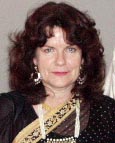 Dr. Marcia Hermansen is a Professor of Theology at Loyola University Chicago where she teaches courses in Islamic Studies and World Religions. She received her Ph.D. from the University of Chicago in Arabic and Islamic Studies. In the course of her research and language training she live for extended periods in Egypt, Jordan, India, Iran and Pakistan. She conducts research in Arabic, Persian and Urdu as well as the major European languages. Her book, The Conclusive Argument from God, a study and translation from the Arabic of Shah Wali Allah of Delhi's, Hujjat Allah al-Baligha, was published in 1996. Dr. Hermansen has also contributed numerous academic articles in the fields of Islamic thought, Islam and Muslims in South Asia, Muslims in America and Women in Islam. Dr. Marcia Hermansen is a Professor of Theology at Loyola University Chicago where she teaches courses in Islamic Studies and World Religions. She received her Ph.D. from the University of Chicago in Arabic and Islamic Studies. In the course of her research and language training she live for extended periods in Egypt, Jordan, India, Iran and Pakistan. She conducts research in Arabic, Persian and Urdu as well as the major European languages. Her book, The Conclusive Argument from God, a study and translation from the Arabic of Shah Wali Allah of Delhi's, Hujjat Allah al-Baligha, was published in 1996. Dr. Hermansen has also contributed numerous academic articles in the fields of Islamic thought, Islam and Muslims in South Asia, Muslims in America and Women in Islam.
Karim H. Karim
Associate Professor - School of Journalism and Communicationin
Carleton University
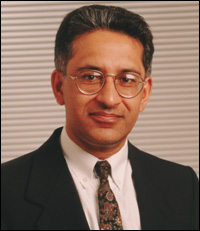 Karim H. Karim is an Associate Professor in Carleton University's School of Journalism and Communication in Ottawa, Canada. He has previously worked in the Government of Canada at senior levels and as a journalist for Europe-based news agencies. His book, Islamic Peril: Media and Global Violence (Black Rose Books, 2003), won the inaugural Robinson Book Prize. Dr. Karim is also editor of The Media of Diaspora (London: Routledge, 2003) and has also published extensively on issues of communications technology, citizenship, culture, ethnicity, and myth. He is presently leading an international team of scholars on a research project that is inquiring into the influence of diasporic Muslim intellectuals on Muslim communities in Canada, the U.S. and the U.K. Karim H. Karim is an Associate Professor in Carleton University's School of Journalism and Communication in Ottawa, Canada. He has previously worked in the Government of Canada at senior levels and as a journalist for Europe-based news agencies. His book, Islamic Peril: Media and Global Violence (Black Rose Books, 2003), won the inaugural Robinson Book Prize. Dr. Karim is also editor of The Media of Diaspora (London: Routledge, 2003) and has also published extensively on issues of communications technology, citizenship, culture, ethnicity, and myth. He is presently leading an international team of scholars on a research project that is inquiring into the influence of diasporic Muslim intellectuals on Muslim communities in Canada, the U.S. and the U.K.
Construction of the 'Other'
amongst the Abrahamic Faiths Panelists
Chair
Harvey Cox
Hollis Professor of Divinity
Harvard Divinity School

Harvey Cox, Jr., has been teaching at Harvard since the early 1960s, both at HDS and in the Faculty of Arts and Sciences. Earlier, as an American Baptist minister, he was the Protestant chaplain at Temple University and the director of religious activities at Oberlin College; he was also an ecumenical fraternal worker in Berlin with the Gossner Mission and Evangelical Academy, and a professor at Andover Newton Theological School. His research and teaching interests focus on the interaction of religion, culture, and politics. Among the issues he explores are urbanization, theological developments in world Christianity, Jewish-Christian relations, and current spiritual movements and church ministry in the global setting (especially in Latin America and Asia; and particularly the global growth of Pentecostalism). He has been a visiting professor at Brandeis University, Seminario Bautista de Mexico; the Naropa Institute, and the University of Michigan. He is a prolific and much acclaimed author. His most recent book is Common Prayers: Faith, Family, and a Christian's Journey Through the Jewish Year. His other books include The Secular City, The Feast of Fools, The Seduction of the Spirit, Religion in the Secular City, The Silencing of Leonardo Boff: Liberation Theology and the Future of World Christianity, Many Mansions: A Christian's Encounters with Other Faiths, and Fire From Heaven: The Rise of Pentecostal Spirituality and The Reshaping of Religion in the Twenty-First Century. He is now completing a book on contemporary literary, artistic, and poetic depictions of Jesus. He writes a column for beliefnet.com.
courses recently taught:
- Seminar: Religious Values and Cultural Conflict
- Jerusalem–An Interdisciplinary Inquiry
- Christianity in the Non-Western World
- Thinking about Thinking
- Contemporary Interpretations of Jesus
News:
Panelists
Mahmoud Ayoub
Professor of Islamic Studies and Comparative Religion
Temple University
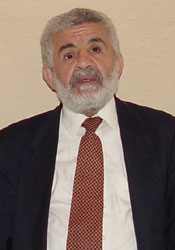 Mahmoud Ayoub was born in 1938 in south Lebanon. Upon completion of his education, he has authored a number of books in English and Arabic in the area of Islam and Inter-religious dialogue. The most notable are Redemptive Suffering in Islam and The Qur’an and Its Interpreters (2 volumes to date). He has published over fifty scholarly articles both as chapters in edited works as well as in well-known academic refereed journals. Two of his recent works are Crisis of Muslim History: Religion and Politics in Early Islam, 2003, and (forthcoming, 2004) Islam in Faith and History (both published by Oneworld Publications). Currently he is working on the third volume of The Qur’an and Its Interpreters. Mahmoud Ayoub was born in 1938 in south Lebanon. Upon completion of his education, he has authored a number of books in English and Arabic in the area of Islam and Inter-religious dialogue. The most notable are Redemptive Suffering in Islam and The Qur’an and Its Interpreters (2 volumes to date). He has published over fifty scholarly articles both as chapters in edited works as well as in well-known academic refereed journals. Two of his recent works are Crisis of Muslim History: Religion and Politics in Early Islam, 2003, and (forthcoming, 2004) Islam in Faith and History (both published by Oneworld Publications). Currently he is working on the third volume of The Qur’an and Its Interpreters.
Rabbi Reuven Firestone
Professor of Medieval Judaism and Islam
Director of the Edgar F. Magnin School of Graduate Studies
Hebrew Union College-Jewish Institute of Religion
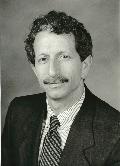 Reuven Firestone was born in Santa Rosa, California in 1952 and educated at Antioch College, the Hebrew University in Jerusalem, Hebrew Union College where he received his M.A. in Hebrew literature in 1980 and Rabbinic Ordination in 1982, and New York University where he received his Ph.D. in Arabic and Islamic studies in 1988. From 1987 to 1992, he taught Hebrew literature and directed the Hebrew and Arabic language programs at Boston University. In 1992 he was awarded the Yad Hanadiv Research Fellowship at the Hebrew University, where he spent the year conducting research on holy war in Islamic tradition. In 2000, Professor Firestone was awarded a fellowship for independent research from the National Endowment for the Humanities for his research on holy war in Judaism, and was chosen to be a fellow of the Institute for Advanced Jewish Studies at the University of Pennsylvania in 2002. Since 1993 he has served as associate and then full professor of Medieval Judaism and Islam at Hebrew Union College in Los Angeles, where he directs the Edgar F. Magnin School for Graduate Studies. Professor Firestone is currently the director of the Institute for the Study of Jewish-Muslim Interrelations at HUC. Reuven Firestone was born in Santa Rosa, California in 1952 and educated at Antioch College, the Hebrew University in Jerusalem, Hebrew Union College where he received his M.A. in Hebrew literature in 1980 and Rabbinic Ordination in 1982, and New York University where he received his Ph.D. in Arabic and Islamic studies in 1988. From 1987 to 1992, he taught Hebrew literature and directed the Hebrew and Arabic language programs at Boston University. In 1992 he was awarded the Yad Hanadiv Research Fellowship at the Hebrew University, where he spent the year conducting research on holy war in Islamic tradition. In 2000, Professor Firestone was awarded a fellowship for independent research from the National Endowment for the Humanities for his research on holy war in Judaism, and was chosen to be a fellow of the Institute for Advanced Jewish Studies at the University of Pennsylvania in 2002. Since 1993 he has served as associate and then full professor of Medieval Judaism and Islam at Hebrew Union College in Los Angeles, where he directs the Edgar F. Magnin School for Graduate Studies. Professor Firestone is currently the director of the Institute for the Study of Jewish-Muslim Interrelations at HUC.
Professor Firestone authored the books, Journeys in Holy Lands: The Evolution of the Abraham-Ishmael Legends in Islamic Exegesis (SUNY Press), Jihad: The Origin of Holy War in Islam (Oxford University Press), Children of Abraham: An Introduction to Judaism for Muslims (Ktav), and dozens of articles on Judaism, Islam, and comparative studies between Judaism, Christianity and Islam. His articles appear in The Journal of Semitic Studies, The Journal of Near Eastern Studies, The Journal of Religious Ethics, The Journal of the American Academy of Religion, The Journal of Jewish Studies, Jewish Quarterly Review, Judaism, Studia Islamica, The Muslim World, The Journal of Ecumenical Studies, The Encyclopaedia of Islam, The Encyclopaedia of the Qur'an, and the Encyclopedia of Religion.
Professor Firestone has been invited to lecture at numerous colleges and universities, including Brandeis University, Massachusetts Institute of Technology, Oxford University, University of Denver, Bates College, University of California at Berkeley, University of California at Los Angeles, American University, George Washington University, Drew University, Northeastern University, Hebrew University, Tel-Aviv University, Ben-Gurion University of the Negev, Boston University, San Diego State University, University of Texas at Austin, California State University at Northridge, and the University of Southern California. He has also lectured and led workshops in numerous churches and synagogues throughout the country.
Having traveled extensively in the Middle East, Reuven Firestone served on the international "Voice of Peace" radio project, lived on an Israeli kibbutz where he worked in the dairy for two years, and has been involved in a variety of committees and commissions exploring Jewish-Muslim and Jewish-Arab relations in the United States. In addition to his academic and community work, Reuven enjoys living in Los Angeles with his wife Ruth H. Sohn, a rabbi, teacher and writer, and his three children, Rachel, Noam, and Amir.
Patrice Brodeur
Dean of Religious and Spiritual Life
Assistant Professor of Religious Studies
Director, Pluralism Project at Connecticut College
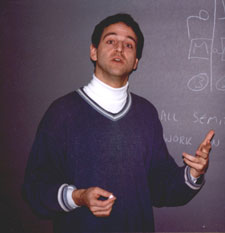 Professor Brodeur's main area of interest is the contemporary study of Islam within the broader academic study of religion, as reflected in his current book project on contemporary Arab Muslim perceptions of religious Others. This focus is framed by a broader set of interests that include the relationship between religion and applied religion as well as that between global and local religion/s, all reflected in his interdisciplinary pedagogy. Professor Brodeur's main area of interest is the contemporary study of Islam within the broader academic study of religion, as reflected in his current book project on contemporary Arab Muslim perceptions of religious Others. This focus is framed by a broader set of interests that include the relationship between religion and applied religion as well as that between global and local religion/s, all reflected in his interdisciplinary pedagogy.
His courses include the team-teaching of "The Study of Religion," "Theories of Religion", "Perspectives on Modern Global Society" and an advanced "Colloquium in the Study of Religion" that examines recent and innovative publications in the academic study of religion. His own courses explore the "Islamic Tradition" from both phenomenological and anthropological perspectives, integrating the latest web technology, as well as "Islam in North America", using historical and sociological approaches. He also teaches comparative religion courses such as "Mysticism in Judaism, Christianity, and Islam", "Women in Judaism, Christianity, and Islam," and "Religions in New London", a service-learning course linked to the Pluralism Project at Connecticut College that he directs. This project is affiliated with the Pluralism Project at Harvard University that maps the new religious diversity of the United States. He is working towards a joint book and website publication on the religious communities of New London.
Professor Brodeur has published a number of articles including: "The Changing Nature of Islamic Studies and American Religious History," (part 1 & 2) in The Muslim World; "Contemporary Arabic Muslim Writings on Religions other than Islam: A Framework for Inquiry," in Muslim Perceptions of Other Religions: A Historical Survey, ed. by Jacques Waardenburg; "La Personne," in Philosopher 2: Les intérrogations contemporaines, Matériaux pour un enseignement, ed. by Christian Delacampagne and Robert Maggiori; and "Introduction to the Guidelines for an Inter-faith Celebration," in the Journal of Ecumenical Studies. His book reviews have appeared in a variety of journals and he is currently the book review editor for The Muslim World, an academic journal devoted to the study of Islam and Christian-Muslim relations.
Professor Brodeur was a Fellow at the Center for the Study of World Religions at Harvard University and received a summer National Endowment for the Humanities grant to study Islam at the Center for Muslim-Christian Understanding at Georgetown University. He studied at both the Hebrew University of Jerusalem and at the University of Jordan. He has delivered papers at various academic conferences and lectured around the world.
Since September 11, 2001, he has actively participated in public debates at local, national, and international levels in the form of articles, lectures, and interviews in a variety of media (MSNBC, NPR, AFP, The Washington Times, etc.) Through his combination of theoretical and applied research activities, Professor Brodeur aims to clarify their interdependence, in particular in the overlapping areas of Islamic Studies, History of Religion/s, Inter-Religious dialogue, and Conflict Resolution.
Professor Brodeur was appointed Dean of Religious and Spiritual Life in December, 2002.
Francis Peters
Professor of Middle Eastern Studies and History
New York University

F. E. Peters is Professor of History, Religion and Middle Eastern Studies at New York University. A native of NYC, he was trained at St. Louis University in Classical Languages (AB, MA) and in Philosophy (Ph.L), and received his Ph.D. from Princeton in Islamic Studies. His professional interests have since broadened into the comparative study of Judaism, Christianity and Islam and of Muslim Spain. In addition to his regular teaching duties at NYU (where he has won a number of teaching awards), Peters has been featured on CBS' Sunrise Semester. He has published an autobiography (Ours) and a novel, but his energies have been mostly devoted to academics, with works on Greek philosophy, on the history of Late Antiquity and of Islam, on both Jerusalem and Mecca, on the Muslim pilgrimage, and particularly on the three monotheistic religious communities, The Children of Abraham and Judaism, Christianity and Islam: The Classical Texts and Their Interpretation. His most recent books are Islam. A Guide for Jews and Christians, and the two volume work, The Monotheists: Jews, Christians and Muslims in Conflict and Competition, both from Princeton University Press.
Selected Publications
- Jerusalem: Holy City in the Eyes of Chroniclers, Visitors, Pilgrims, and Prophets from the Days of Abraham to the Beginnings of Modern Times (Princeton: Princeton University Press, 1985).
- Jerusalem and Mecca: The Typology of the Holy City in the Near East (New York: New York University Press, 1987).
- Judaism, Christianity, and Islam: The Classical Texts and Their Interpretations, 3 vols. (Princeton: Princeton University Press).
- Mecca and the Hijaz: A Literary History of the Muslim Holy Land (Princeton: Princeton University Press, 1994).
- The Hajj: The Muslim Pilgrimage to Mecca and the Holy Places (Princeton: Princeton University Press, 1994).
- Muhammad and the Origins of Islam (Albany: SUNY Press, 1994).
-
Islam, A Guide for Jews and Christians (Princeton: Princeton University Press, Spring 2003).
- The Monotheists: Jews, Christians and Muslims in Conflict and Competition (2 Volumes, Princeton: Princeton University Press, Fall 2003).
|

